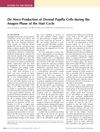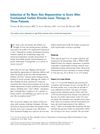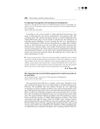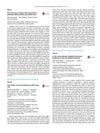 August 2024 in “Stem Cell Research & Therapy”
August 2024 in “Stem Cell Research & Therapy” New regenerative therapies show promise for treating hair loss.
Editing the FGF5 gene in sheep increases fine wool growth.
 February 2024 in “Bioengineering”
February 2024 in “Bioengineering” The hydrogel made of chitosan, HPMC, and insulin speeds up wound healing and could be a new dressing, especially for diabetics.
 February 2024 in “Animals”
February 2024 in “Animals” Giving selenium yeast to pregnant goats leads to better hair growth and cashmere quality in their babies.
 February 2023 in “Journal of Advanced Research”
February 2023 in “Journal of Advanced Research” A new method using Platelet-rich Plasma (PRP) in a microneedle can promote hair regrowth more efficiently and is painless, minimally invasive, and affordable.
Natural products may help treat hair loss by promoting hair growth with fewer side effects.
44 citations,
January 2011 in “Journal of biotechnology” Scientists recreated human hair follicles in the lab that can grow hair.
 41 citations,
June 2010 in “Journal of Investigative Dermatology”
41 citations,
June 2010 in “Journal of Investigative Dermatology” New cells are added to the hair's dermal papilla during the active growth phase.
 36 citations,
March 2019 in “European Journal of Human Genetics”
36 citations,
March 2019 in “European Journal of Human Genetics” The research found genetic differences in identical twins that could explain why one twin has a disease while the other does not.
 20 citations,
April 2011 in “Dermatologic Surgery”
20 citations,
April 2011 in “Dermatologic Surgery” Laser therapy helped new hair grow in scarred skin for three patients.
 2 citations,
February 2019 in “bioRxiv (Cold Spring Harbor Laboratory)”
2 citations,
February 2019 in “bioRxiv (Cold Spring Harbor Laboratory)” The Asiatic lion has very low genetic diversity and unique genetic traits, highlighting the need for its conservation.
 June 2007 in “Faculty Opinions – Post-Publication Peer Review of the Biomedical Literature”
June 2007 in “Faculty Opinions – Post-Publication Peer Review of the Biomedical Literature” Hair can regrow in adult mice's skin after injury, and this regrowth doesn't come from existing hair cells but from skin cells in the wound, with Wnt7a protein helping this process. This could help treat baldness and scarring.
 May 2007 in “Faculty Opinions – Post-Publication Peer Review of the Biomedical Literature”
May 2007 in “Faculty Opinions – Post-Publication Peer Review of the Biomedical Literature” Hair can regrow in adult mice's skin after injury, and this process can be boosted by increasing Wnt7a, a protein. This could potentially help treat baldness and change our understanding of hair growth.
 May 2007 in “Faculty Opinions – Post-Publication Peer Review of the Biomedical Literature”
May 2007 in “Faculty Opinions – Post-Publication Peer Review of the Biomedical Literature” Hair can regrow in adult mice's skin after injury, and this regrowth doesn't come from existing hair cells but from skin cells in the wound, with Wnt7a protein helping this process. This could help treat baldness and scarring.
 829 citations,
May 2007 in “Nature”
829 citations,
May 2007 in “Nature” Hair follicles can regrow in wounded adult mouse skin using a process like embryo development.
39 citations,
September 2018 in “American Journal of Medical Genetics Part A” A new genetic mutation in the ODC1 gene causes developmental delay and other symptoms in a young girl.
Potential new drugs for treating PCOS were identified.
 May 2018 in “Journal of Investigative Dermatology”
May 2018 in “Journal of Investigative Dermatology” DNMT3A is crucial for healthy skin and hair growth.
 January 2008 in “The Year book of dermatology”
January 2008 in “The Year book of dermatology” After skin injury, adult mice can grow new hair follicles, and this process can be increased or stopped by manipulating Wnt signals.
 2 citations,
December 2018 in “Novos Estudos Jurídicos”
2 citations,
December 2018 in “Novos Estudos Jurídicos” Predictive computational analyses have evolved biopower by using technology to track and predict individual and group behaviors.
March 2024 in “International journal of molecular sciences” Three specific genetic variants cause severe skin issues in children with EBS, highlighting the need for early genetic screening.
 September 2016 in “Journal of dermatological science”
September 2016 in “Journal of dermatological science” Adult skin cells can be used to create new hair in a lab.
 December 2010 in “Faculty Opinions – Post-Publication Peer Review of the Biomedical Literature”
December 2010 in “Faculty Opinions – Post-Publication Peer Review of the Biomedical Literature” New cells join the hair's dermal papilla during the growth phase, possibly affecting hair thickness.
 30 citations,
April 2020 in “Stem Cell Research & Therapy”
30 citations,
April 2020 in “Stem Cell Research & Therapy” PI3K/Akt pathway is crucial for hair growth and regeneration.
 24 citations,
May 2019 in “PLOS ONE”
24 citations,
May 2019 in “PLOS ONE” The African spiny mouse can fully regenerate its muscle without scarring, unlike the common house mouse.
9 citations,
May 2014 in “BMC medical genetics” A woman with a unique syndrome similar to TRPS has a genetic change near the TRPS1 gene, affecting its regulation.

A person with a new mutation in the SCN1A gene developed brain inflammation after COVID-19.
 256 citations,
October 2013 in “Proceedings of the National Academy of Sciences of the United States of America”
256 citations,
October 2013 in “Proceedings of the National Academy of Sciences of the United States of America” Growing human skin cells in a 3D environment can stimulate new hair growth.
 10 citations,
June 2019 in “Journal of Tissue Engineering and Regenerative Medicine”
10 citations,
June 2019 in “Journal of Tissue Engineering and Regenerative Medicine” Scientists successfully grew new hair follicles in regenerated mouse skin using mouse and human cells.
 8 citations,
October 2016 in “Experimental dermatology”
8 citations,
October 2016 in “Experimental dermatology” Hair follicles may help teach the immune system to tolerate new self-antigens, but this can sometimes cause hair loss.























